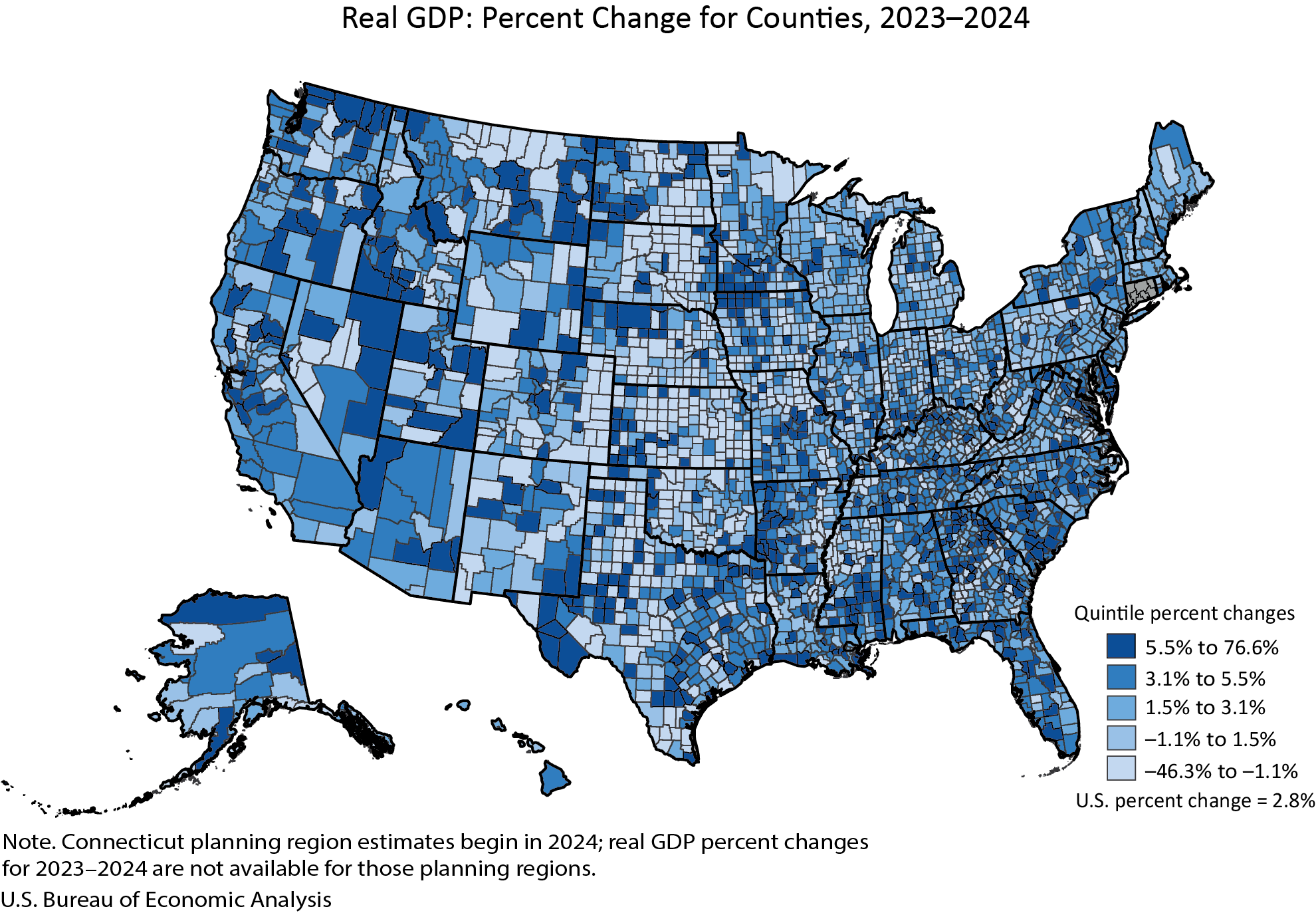Bureau of Economic Analysis
Gross Domestic Product by County and Personal Income by County, 2024
Real gross domestic product (GDP) increased in 2,273 counties, decreased in 809 counties, and was unchanged in 24 counties in 2024. County-level changes ranged from a 76.6 percent increase in Carter County, MT, to a 46.3 percent decline in Baca County, CO.
Personal income, in current dollars, increased in 2,768 counties, decreased in 331, and was unchanged in 7 counties in 2024. County-level changes ranged from a 22.6 percent increase in Harding County, SD, to a 23.3 percent decline in Issaquena County, MS.
Principal Federal Economic Indicators
Noteworthy
The Latest
Activities of U.S. Affiliates of Foreign Multinational Enterprises, 2020
Majority-owned U.S. affiliates (MOUSAs) of foreign multinational enterprises employed 7.86 million workers in the United States in 2020, a 2.8 percent decrease from 8.08 million workers in 2019, according to the U.S. Bureau of Economic Analysis. MOUSAs accounted for 6.4 percent of total private industry employment in the United States in 2020.
Activities of U.S. Affiliates of Foreign Multinational Enterprises, 2020
Majority-owned U.S. affiliates (MOUSAs) of foreign multinational enterprises employed 7.86 million workers in the United States in 2020, a 2.8 percent decrease from 8.08 million workers in 2019, according to the U.S. Bureau of Economic Analysis. MOUSAs accounted for 6.4 percent of total private-industry employment in the United States in 2020.
June 2022 Trade Gap is $79.6 Billion
The U.S. monthly international trade deficit decreased in June 2022 according to the U.S. Bureau of Economic Analysis and the U.S. Census Bureau. The deficit decreased from $84.9 billion in May (revised) to $79.6 billion in June, as exports increased and imports decreased. The previously published May deficit was $85.5 billion. The goods deficit decreased$4.9 billion in June to $99.5 billion. The services surplus increased $0.3 billion in…
U.S. International Trade in Goods and Services, June 2022
The U.S. monthly international trade deficit decreased in June 2022 according to the U.S. Bureau of Economic Analysis and the U.S. Census Bureau. The deficit decreased from $84.9 billion in May (revised) to $79.6 billion in June, as exports increased and imports decreased. The previously published May deficit was $85.5 billion. The goods deficit decreased $4.9 billion in June to $99.5 billion. The services surplus increased $0.3 billion in June…
Personal Income and Outlays, June 2022
Personal income increased $133.5 billion, or 0.6 percent at a monthly rate, while consumer spending increased $181.1 billion, or 1.1 percent, in June. The increase in personal income primarily reflected increases in compensation and proprietors’ income. The personal saving rate (that is, personal saving as a percentage of disposable personal income) was 5.1 percent in June, compared with 5.5 percent in May.
Personal Income and Outlays, June 2022
Personal income increased $133.5 billion, or 0.6 percent at a monthly rate, while consumer spending increased $181.1 billion, or 1.1 percent, in June. The increase in personal income primarily reflected increases in compensation and proprietors’ income. The personal saving rate (that is, personal saving as a percentage of disposable personal income) was 5.1 percent in June, compared with 5.5 percent in May.
Gross Domestic Product, Second Quarter 2022
Real gross domestic product (GDP) decreased at an annual rate of 0.9 percent in the second quarter of 2022, following a decrease of 1.6 percent in the first quarter. The smaller decrease in the second quarter primarily reflected an upturn in exports and a smaller decrease in federal government spending. For more details, including source data, refer to the Technical Note.
Gross Domestic Product, Second Quarter 2022 (Advance Estimate)
Real gross domestic product (GDP) decreased at an annual rate of 0.9 percent in the second quarter of 2022, following a decrease of 1.6 percent in the first quarter. The smaller decrease in the second quarter primarily reflected an upturn in exports and a smaller decrease in federal government spending.
Gross Domestic Product for Puerto Rico, 2020
Real gross domestic product (GDP) for Puerto Rico decreased 6.0 percent in 2020 after increasing 0.2 percent in 2019 (table 1.3), according to statistics released today by the U.S. Bureau of Economic Analysis (BEA). The decrease in real GDP in 2020 primarily reflected a decrease in exports of goods and services (table 1.4). Personal consumption expenditures, government spending, and private fixed investment also decreased. These decreases were…
Producto interior bruto para Puerto Rico, 2020
El producto interior bruto real (PIB) para Puerto Rico decreció 6.0 por ciento en 2020, luego de crecer 0.2 por ciento en 2019, de acuerdo con las estadísticas difundidas hoy por el Negociado de Análisis Económico de EE. UU. (BEA por sus siglas en inglés). La disminución del PIB real en 2020 reflejó principalmente un decrecimiento de las exportaciones de bienes y servicios. El gasto del consumidor, el gasto del gobierno, y la inversión privada…




